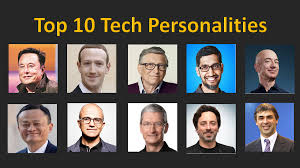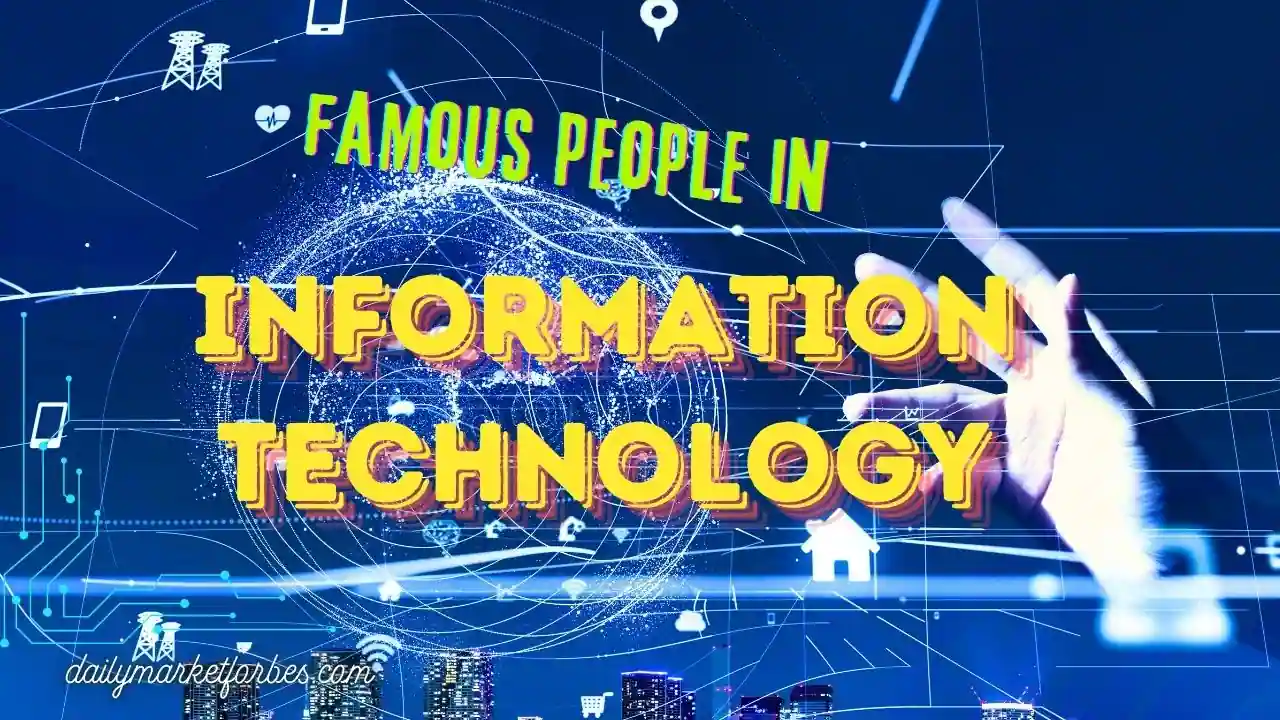Introduction to Information Systems People Technology and Processes
Famous People in Information Technology (IT) has revolutionized the way we live, work, and communicate. In today’s digital age, technology is woven into the fabric of our daily lives, making it indispensable. But behind every great technological innovation is a visionary who dared to dream big and brought those dreams to life. This article celebrates the famous personalities who have significantly impacted information technology and examines their contributions that continue to shape our world.
Pioneers in Information Technology
Alan Turing
Alan Turing is often referred to as the father of modern computing. A British mathematician, logician, and cryptanalyst, Turing laid the groundwork for computer science long before the invention of the modern computer.
Contributions to Computer Science
Turing’s most notable contribution to computer science is the concept of the Turing Machine, a theoretical device that manipulates symbols on a strip of tape according to a set of rules. This model became a foundational concept in the theory of computation and artificial intelligence.
Impact on Cryptography and Artificial Intelligence
During World War II, Turing’s work at Bletchley Park was crucial in cracking the Enigma code, which the Nazis used to encrypt their communications. His efforts not only helped the Allies win the war but also set the stage for future developments in cryptography. Additionally, his work on artificial intelligence led to the Turing Test, a criterion for determining whether a machine can exhibit human-like intelligence.
Grace Hopper
Grace Hopper was an American computer scientist and United States Navy rear admiral who significantly impacted the development of computer programming.
Development of COBOL
Hopper’s most notable achievement was her work on developing the Common Business-Oriented Language (COBOL), one of the earliest high-level programming languages. This innovation made programming more accessible and allowed businesses to harness the power of computers effectively.
Role in Programming Language Evolution
Hopper was a pioneer in developing compiler technology, which translates human-readable code into machine-readable instructions. Her work paved the way for the evolution of programming languages and significantly improved the efficiency of computer programming.

Bill Gates
Bill Gates is a household name synonymous with the rise of personal computing. As the co-founder of Microsoft, Gates played a pivotal role in bringing computers into homes and offices worldwide.
Founding of Microsoft
In 1975, Gates co-founded Microsoft with Paul Allen, aiming to put a computer on every desk and in every home. Under his leadership, Microsoft developed the Windows operating system, which became the dominant platform for personal computers.
Contributions to Personal Computing
Gates’s vision and business acumen transformed Microsoft into a global technology leader. His contributions to personal computing have made it more accessible and affordable for millions, significantly impacting how we work and communicate.
Steve Jobs
Steve Jobs, the co-founder of Apple Inc., was a visionary leader whose innovative ideas and design aesthetics transformed the technology industry.
Co-founding of Apple
In 1976, Jobs, along with Steve Wozniak and Ronald Wayne, founded Apple Computer, Inc. The company’s first product, the Apple I, revolutionized the personal computer industry by making technology more accessible to the general public.
Influence on Design and Innovation
Jobs was known for his attention to detail and emphasis on user experience. His focus on design and innovation led to the creation of iconic products such as the iPod, iPhone, and iPad, which have become integral to modern life. His legacy continues to influence technology and design standards worldwide.
Tim Berners-Lee
Tim Berners-Lee, a British computer scientist, is credited with inventing the World Wide Web, a transformative innovation that changed how we access and share information.
Inventing the World Wide Web
In 1989, Berners-Lee proposed a system to share information using hypertext, which led to the creation of the World Wide Web. His vision of a free and open web democratized access to information and enabled global communication and collaboration.
Contributions to Web Development
Berners-Lee’s contributions extend beyond the web’s invention; he also developed the first web browser and web server. His work laid the foundation for the internet as we know it today, fostering a new era of connectivity and museum informatics people information and technology in museums.
Linus Torvalds
Linus Torvalds is a Finnish-American software engineer who created the Linux operating system kernel. His contributions to the open-source movement have had a profound impact on software development.
Creation of Linux
In 1991, Torvalds released the first version of the Linux kernel, a free and open-source operating system that has become a cornerstone of the internet and enterprise computing. Linux’s flexibility and reliability have made it a popular choice for servers, embedded systems, and even personal computers.
Impact on Open Source Movement
Torvalds’s advocacy for open-source software has inspired a global community of developers to collaborate and innovate. The open-source model has led to the creation of numerous software projects, fostering a culture of collaboration and shared knowledge.
Modern Influencers in IT
Elon Musk
Elon Musk is a technology entrepreneur and visionary leader known for his ambitious projects and groundbreaking innovations.
Contributions to SpaceX and Tesla
As the CEO of SpaceX and Tesla, Musk has pushed the boundaries of space exploration and sustainable energy. SpaceX’s achievements include reusable rockets and plans for Mars colonization, while Tesla has revolutionized the automotive industry with its electric vehicles and renewable energy solutions.
Role in Pioneering Artificial Intelligence and Transportation
Musk’s ventures extend beyond space and energy; he is also involved in developing artificial intelligence and transportation technologies. Through projects like Neuralink and The Boring Company, Musk aims to enhance human capabilities and transform urban transportation.
Satya Nadella
Satya Nadella is the CEO of Microsoft, who has led the company through significant growth and transformation.
Leadership at Microsoft
Since taking the helm in 2014, Nadella has focused on cloud computing, artificial intelligence, and productivity solutions. His leadership has helped Microsoft adapt to changing market dynamics and remain a leader in the technology industry & people journal.
Focus on Cloud Computing and AI
Under Nadella’s guidance, Microsoft has expanded its cloud services through Azure, offering businesses and developers scalable and secure solutions. Additionally, the company has invested heavily in artificial intelligence, integrating AI capabilities into its products and services.
Sundar Pichai
Sundar Pichai is the CEO of Alphabet Inc. and its subsidiary Google. His leadership has been instrumental in shaping the future of internet technology and digital products.
Role in Developing Google Products
Pichai has overseen the development of key Google products such as Chrome, Android, and Google Search. His focus on user experience and innovation has helped Google maintain its position as a leader in the tech industry.
Contributions to Internet Accessibility and Technology
Pichai’s efforts to expand internet access and affordability through initiatives like Project Loon and Google Fiber have helped bridge the digital divide and empower users around the world.
Women in Information Technology and People Impact Factor
Ada Lovelace
Ada Lovelace, an English mathematician and writer, is often regarded as the world’s first computer programmer.
First Computer Programmer
In the 1840s, Lovelace worked on Charles Babbage’s Analytical Engine, a mechanical general-purpose computer. She recognized the machine’s potential to perform complex calculations and wrote the first algorithm intended to be processed by a machine.
Influence on Future Generations
Lovelace’s pioneering work laid the groundwork for future generations of computer scientists and programmers. Her contributions have inspired countless women to pursue careers in technology and engineering.
Sheryl Sandberg
Sheryl Sandberg is the Chief Operating Officer of Facebook (now Meta) and a prominent advocate for women’s leadership and empowerment.
Leadership at Facebook (Meta)
Since joining Facebook in 2008, Sandberg has played a key role in the company’s growth and success. She has been instrumental in developing the company’s advertising and business strategies, helping Facebook become a dominant player in the social media landscape.
Contributions to Online Advertising and Social Media
Sandberg’s expertise in online advertising and data analytics has helped Facebook create targeted and effective advertising solutions. Her work has transformed how businesses reach and engage with their audiences on social media platforms.
Susan Wojcicki
Susan Wojcicki is the CEO of YouTube and a prominent figure in the technology industry, known for her leadership and innovation in video streaming and content creation.
Leadership at YouTube
Wojcicki joined Google in 1999 and played a crucial role in the company’s early growth. As the CEO of YouTube, she has overseen the platform’s expansion and transformation into the world’s largest video-sharing platform.
Role in Video Streaming and Content Creation
Under Wojcicki’s leadership, YouTube has become a hub for content creators, offering a platform for creative expression and monetization. Her efforts have helped shape the future of video streaming and digital media.
Impact of IT Personalities on Society
Technological Advancements
The contributions of IT pioneers and modern influencers have driven significant technological advancements, from the development of programming languages and operating systems to the creation of innovative hardware and software solutions. These advancements have transformed industries, improved efficiency, and opened up new possibilities for innovation.
Influence on Global Communication
Information technology has revolutionized global communication, enabling people to connect and collaborate across borders and time zones. The innovations introduced by IT leaders have facilitated the exchange of information and ideas, fostering a more connected and informed world.
Shaping the Future of Work and Lifestyle
The impact of IT personalities extends beyond technology and into the way we work and live. Their innovations have transformed how we approach work, education, healthcare, and entertainment, shaping a future where technology plays an integral role in our daily lives.
Future of IT and Emerging Figures
Predictions for Future Leaders
As technology continues to evolve, new leaders and innovators are emerging, poised to make their mark on the IT industry. These individuals will drive the development of emerging technologies such as artificial intelligence, quantum computing, and biotechnology, shaping the future of people process technology information security.
Emerging Technologies and Innovators
The future of IT is full of possibilities, with emerging technologies like blockchain, virtual reality, and 5G set to transform how we interact with technology and each other. Innovators in these fields are working to harness the potential of these technologies and create new solutions to address global challenges.
Conclusion
The impact of famous people in information technology is undeniable. From the pioneers who laid the groundwork for modern computing to the influencers who continue to push the boundaries of innovation, these individuals have shaped the world we live in today. Their contributions have transformed industries, empowered individuals, and connected the world in ways we never thought possible. As we look to the future, the ongoing importance of IT leaders and their impact on society will continue to inspire and drive progress.
FAQs
What makes someone influential in IT?
Influential individuals in IT are typically those who have significantly contributed to the development and advancement of technology, whether through innovative ideas, groundbreaking products, or leadership in the tech industry. These individuals often drive change, inspire others, and shape the direction of the industry.
How do IT leaders impact daily life?
IT leaders impact daily life by developing and implementing technologies that improve how we work, communicate, and access information. Their innovations can lead to more efficient and convenient solutions, making everyday tasks easier and more accessible.
What are some of the biggest challenges in IT?
Some of the biggest challenges in IT include cybersecurity threats, data privacy concerns, and the ethical implications of emerging technologies like artificial intelligence. Additionally, the rapid pace of technological change can make it difficult for individuals and organizations to keep up with the latest trends and developments.
How can one become influential in IT?
To become influential in IT, individuals can focus on developing their skills and expertise in a specific technology area, such as programming, data analysis, or cybersecurity. Additionally, staying informed about the latest trends and developments in the industry, networking with other professionals, and seeking opportunities to contribute to innovative projects can help build a reputation as a thought leader in the field.
Who are the upcoming stars in IT?
Upcoming stars in IT include individuals working on cutting-edge technologies like artificial intelligence, quantum computing, and biotechnology. These innovators are poised to make significant contributions to the industry and shape the future of information technology.







Be First to Comment